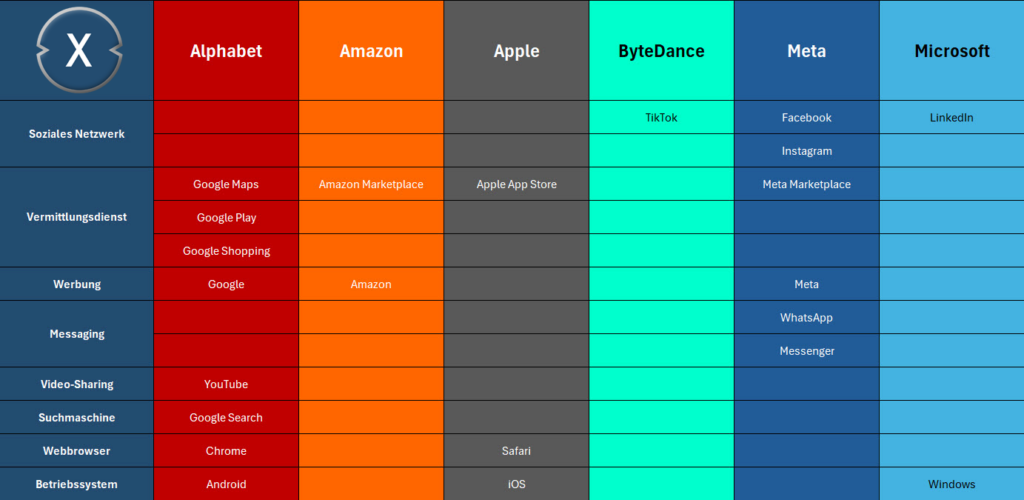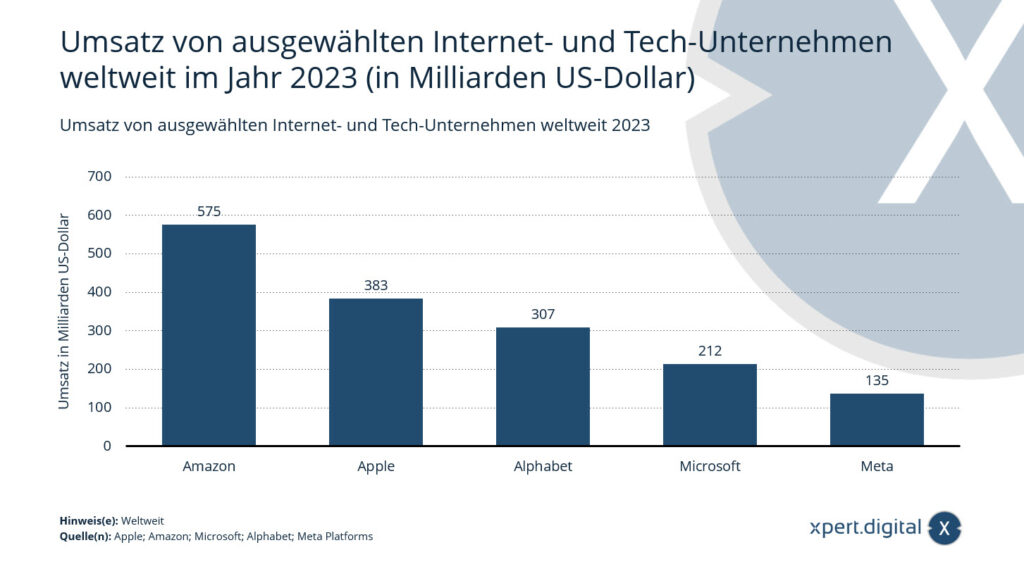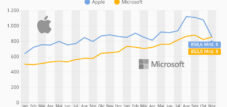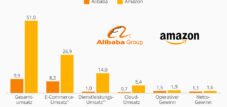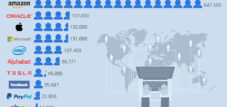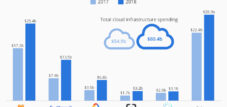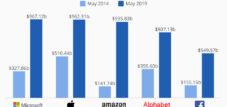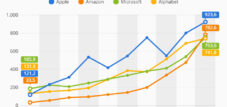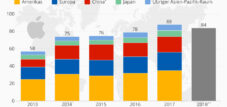Competition regulation with the Digital Markets Act (DMA) for Alphabet, Meta, Amazon, Apple, Microsoft, Alibaba, eBay, Netflix and others
Language selection 📢
Published on: March 29, 2024 / Update from: March 29, 2024 - Author: Konrad Wolfenstein
🔒 The Digital Markets Act: Groundbreaking regulation for large online platforms
📜 Introduction to the Digital Markets Act (DMA)
In October 2022, the European Union adopted the Digital Markets Act (DMA), which is primarily intended to regulate so-called “very large online platforms” and their potentially business-damaging practices. According to the DMA, dominant online companies such as Alphabet, Apple, Meta or Microsoft, for example, are no longer allowed to represent their own products more prominently than those of competitors in search results and must allow users to be able to access third-party services from their offers. In addition, the possibility must be granted to use other than the pre -installed software such as certain browsers and the deletion of corresponding programs must be possible.
⏳ Implementation of the specifications and initial investigations
For the implementation of these requirements, the EU had granted the company a grace period that expired on March 7, 2024. Nevertheless, some of the “gatekeepers” do not seem to have been adequately fulfilled from their obligations. As Reuters reports, the EU initiated investigations at Apple, Google mother Alphabet and Meta last Monday to uncover potential violations.
📊 Statistical insights and market dominance
A look at the graphic shows how much our digital everyday life is determined by these “very large online platforms”. According to DMA, for example, the META products WhatsApp and Messenger can be found in the messaging category, while Alphabet has virtually monopoly the search and video segment with Google search and YouTube. Three of the six “gatekeepers” are represented in the social media and advertising matters.
🌍 New EU laws for a fair digital market
The new laws for digital markets and digital services, the Digital Markets Act and the Digital Services Act, are the first of their kind to cross national borders and apply across the EU. While the latter is primarily aimed at the e-commerce sector and prescribes new due diligence requirements for large online platforms, the former aims to ensure fairer conditions of competition for services such as social media offers, search engines, operating systems or browsers.
🔊 Statements on the introduction of the new regulation
"Europe has agreed on the world's strictest rules for more competition and fairness among the great digital players," commented Sven Giegold, State Secretary in the Federal Ministry of Economics and Climate Protection. "The large platform companies are subject to clear and hard rules and can no longer determine the rules of the game unilaterally."
🖥️ The digital landscape and the influence of online platforms
In the course of the digital age, online platforms have developed into relevant actors in our daily life. They influence how we shop, communicate, search for and consume information. The significant market shares and spheres of influence of tech giants such as Alphabet (Google), Meta (formerly Facebook), Apple and Amazon have attracted regulatory attention worldwide due to their controversial market power and data practices. A concrete result of this process is the Digital Markets Act (DMA), which was adopted by the European Union in October 2022. The DMA aims to regulate the business practices of so-called “very large online platforms”, often referred to as “gatekeeper”.
🏗️ Objectives and measures of the DMA
The DMA was designed out of the need to ensure a fair and competitive environment in the digital market. The aim is to prevent dominant companies from abusing their market power in order to restrict the scope of action of smaller competitors and new market participants. The Act includes a number of core obligations for gatekeepers aimed at promoting balance between large technology companies and consumers, small businesses and society at large. It affects companies such as Alphabet, Meta, Apple, Amazon, Microsoft, Alibaba, Bytedance, eBay and Netflix, which occupy a key position in the digital economy due to their size and reach.
👩💼👨💼 Consumer rights and promotion of competition
The DMA's regulations include, for example, that online giants are not allowed to favor their own products in their search results and consumers must have the freedom to access third-party offers via these platforms. This also means that users must be given the opportunity to remove or change pre-installed software - such as certain browsers or apps - in order to use alternatives. This is a step towards strengthening consumer rights and promoting innovation through competition.
🔍 Ongoing investigations and compliance
Companies were granted a transition period until March 7, 2024 to make the necessary adjustments. However, Reuters reported that some of the gatekeepers have not yet adequately fulfilled their obligations. As a result, the EU initiated investigations against companies such as Apple, Google parent Alphabet and Meta in order to investigate possible violations of the DMA's requirements.
📈 Dominant Market Position and Digital Services Act
The presence and dominance of these very large online platforms are reflected in numerous areas of everyday digital life. For example, the messaging segment is largely dominated by meta products such as WhatsApp and Messenger, while Alphabet takes significant shares in the search and video segment with Google search and YouTube. In the social media and advertising segment, at least three of the six gatekeepers are often actively involved, which underlines their dominant market position.
💬 Reactions and future direction
The introduction of the DMA, together with the Digital Services Act (DSA), which focuses primarily on the e-commerce sector and sets out due diligence requirements for online platforms, marks a historic moment. Both laws are the first of their kind to apply across borders across the EU. They represent model models for the regulation of digital markets and services at the international level.
🌐 Europe's aspirations for a transparent digital market
Sven Giegold, the then State Secretary in the Federal Ministry for Economic Affairs and Climate Protection, commented on the introduction of the new regulations as unprecedentedly strict and groundbreaking. In his words, Europe has agreed on the world's strictest rules for more competition and fairness among the major digital players. The large platform companies will be subject to clear and tough rules and will no longer be able to unilaterally determine the rules of the game.
🔮 Future of the Digital Markets Act and digital challenges
In the spirit of these regulatory innovations, the DMA represents Europe's ambition to be at the forefront of a fair, transparent and integrated digital market. The targeted regulatory measures are also intended to strengthen the European economy by creating a more level playing field where established companies and start-ups alike can thrive. This is crucial because healthy competition promotes innovation, strengthens consumer protection and ultimately contributes to the creation of high quality jobs and services.
🧐 Observations and expectations regarding implementation
It remains to be seen how the implementation of the DMA will further shape the digital landscape in Europe and beyond. Critics call for transparency and consistent enforcement, while supporters hail the reforms as a crucial step toward securing a digital era characterized by diversity, fairness and equal opportunities. What is already becoming apparent, however, is a historic shift in the way we understand and shape the digital superpowers and our dealings with them.
📣 Similar topics
- 📈 Challenges and Opportunities of the Digital Markets Act (DMA)
- 🌐 EU regulation of online platform giants
- 👩💻 Promoting competition: influence of the DMA and DSA
- 🔧 Strengthening consumer rights in the digital space
- 🛡️ EU-wide measures against the market power of the tech giants
- 🏛️ New era of digital market regulation by the EU
- 📲 Revolution in dealing with pre-installed software and browsers
- 🔍 Promoting transparency and fairness in the search engine sector
- 🏅 Europe's push for a fair digital trading venue
- 🏢 Investigation of competition violations by the EU authorities
#️⃣ Hashtags: #DigitalMarketsAct #EUDigitalRegulation #OnlinePlatforms #TechnologyGiganten #DigitalFairness
🎯🎯🎯 Benefit from Xpert.Digital's extensive, fivefold expertise in a comprehensive service package | R&D, XR, PR & SEM

AI & XR 3D Rendering Machine: Fivefold expertise from Xpert.Digital in a comprehensive service package, R&D XR, PR & SEM - Image: Xpert.Digital
Xpert.Digital has in-depth knowledge of various industries. This allows us to develop tailor-made strategies that are tailored precisely to the requirements and challenges of your specific market segment. By continually analyzing market trends and following industry developments, we can act with foresight and offer innovative solutions. Through the combination of experience and knowledge, we generate added value and give our customers a decisive competitive advantage.
More about it here:
💪 Ranking of the most valuable companies in the world 2024
🌐📈 The global importance of company market capitalization
Company market capitalization represents an indicator that not only characterizes a company's size and economic footprint, but also responds to global economic forces and investor perceptions. This key figure, which measures the total value of company shares based on current share prices, is subject to constant change, which is particularly visible in volatile market phases.
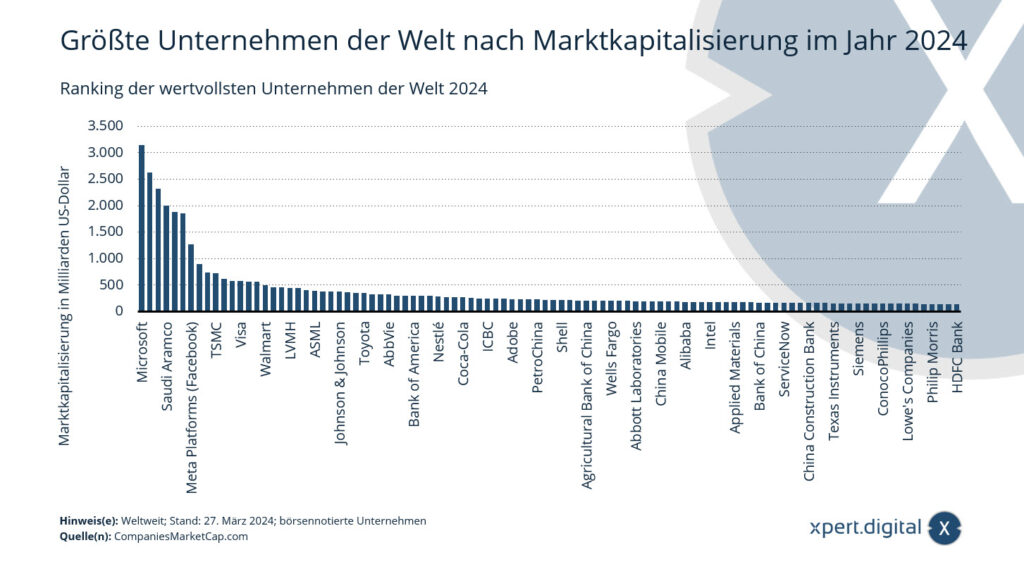
Ranking of the world's most valuable and largest companies by market capitalization in 2024 (in billion US dollars; as of March 2024) - Image: Xpert.Digital
🆙🏢 Microsoft's rise to the world's most valuable company
The US tech company Microsoft is at the epicenter of economic dynamism. At the beginning of 2024, it climbed to the top of the ranking of the world's most valuable companies, measured by their stock market value. The pioneer and long-running favorite Apple, which topped the list for a long time, had to give up its place at the top to its competitor.
💻🚀 Microsoft's dominance thanks to innovations in AI
Microsoft, founded by technology icon Bill Gates, has established itself on a broad front, particularly in the development of hardware and software as well as in the provision of cloud services. As of March 27, 2024, the company's market capitalization reached the astronomical sum of approximately $3.1 trillion. Recent innovations in the field of artificial intelligence played a decisive role in this assessment. Such technologies are seen as key drivers for future increases in productivity and economic upheaval.
🍎🧮 Apple and its strong competitor status
Not far from these impressive figures is the iPhone manufacturer Apple, whose headquarters is in Cupertino, California. With a market capitalization of around $2.62 trillion, Apple also demonstrates a high level of trust among investors and a strong market position.
🖥️🦾 NVIDIA and technological progress
The leading trio is completed by chip manufacturer NVIDIA from the USA, which, with a market value of around 2.31 trillion US dollars, has overtaken both many traditional industrial giants and the previous oil industry giant, Saudi Aramco. This illustrates the powerful rise of the technology industry in the 21st century.
🚀📊 Dominance of the tech giants in the economic ranking
Within the elite club of the 100 most valuable companies in the world there are other names from the technological elite: Alphabet, the parent company of Google, takes fifth place with around 1.88 trillion US dollars, closely followed by Amazon, the giant of the online Trade, with approximately 1.85 trillion US dollars in position six. This seals the dominance of the technology sector in the current economic landscape.
🇩🇪🏭 German companies and their positioning
The German economy, on the other hand, is reflected rather modestly in this ranking of global heavyweights: only two companies – SAP and Siemens – made it into the top 100. The software manufacturer SAP occupies 47th place with a market capitalization of approximately $229.5 billion. Siemens, known for its electrical engineering and automation technologies, is also included in this exclusive list, but further back.
🌟💡 The story behind the numbers
But behind the impressive market capitalization figures lie much more than just monetary valuations - they are stories of innovation, economic acumen and visionary leadership.
Microsoft's promotion to the top is a direct consequence of his continuous adaptability and its innovative strength. The development of the cloud business, Azure, and the continued success of the Windows operating system, as well as the Office package, laid the foundation for long-term success. At the same time, the development of new areas such as artificial intelligence, machine learning and the development of Edge Computing provides solutions to sustainable future securing. The company's vision of “enable every person and every company on earth to achieve more” is supported by these strategic decisions.
Apple, Microsoft's direct competitor, has a similar story to tell. Renowned for its innovative products and services, Apple revolutionized the global mobile technology market with the iPhone. The company has also expanded its product lines to include iPad, Mac, Apple Watch and services such as the App Store and Apple Music. As our society digitally transforms, the ecosystem that Apple has built will continue to act as a fundamental part of our everyday lives.
🔄🌌 NVIDIA's drive for technological breakthroughs
NVIDIA's remarkable achievements in the world of technology have been achieved through groundbreaking advances in graphics processing units for gaming and professional markets, as well as its role in the development of artificial intelligence and autonomous vehicles.
🌱📈 Economic growth and innovative strength
Despite all the rises and falls of market capitalization, it is the desire to innovate that not only keeps these companies on the market, but also leads them to the top. They reflect the central themes of our time: digitalization, artificial intelligence and the relentless pursuit of forward-looking development, which forms the basis of modern economic growth.
📣 Similar topics
- 🏦 The giants of the economy: Microsoft overtakes Apple
- 📈 Market capitalization: The ups and downs of stock market values
- 🌐 Artificial intelligence – driving force of company valuations
- 🔝 Microsoft at the top: The most valuable companies in the world
- 🍏 Apple's stand in global economic dynamics
- 🧠 NVIDIA: Technological rise and importance for the market
- 🌟 The German representatives in the global market: SAP and Siemens
- 🤖 Innovative technologies as the basis for economic success
- 💻 Microsoft's strategy: adaptability and innovation
- 📱 Apple's ecosystem: The foundation of our digital everyday life
#️⃣ Hashtags: #Marketcap #Microsoft #Apple #Technology #Innovation
📈 Here are the top 100 most valuable companies in the world - as of March 2024
Largest companies in the world by market capitalization in 2024 in billion US dollars
- Microsoft – 3,133
- Apple – 2,620
- NVIDIA – 2,314
- Saudi Aramco – 1,994
- Alphabet (Google) – 1,878
- Amazon – 1,852
- Meta Platforms (Facebook) – 1,264
- Berkshire Hathaway – 890.38
- Eli Lilly – 736.74
- TSMC – 720.16
- Broadcom – 617.04
- Novo Nordisk – 577.43
- Visa – 576.37
- Tesla – 565.84
- JPMorgan Chase – 563.77
- Walmart – 487.59
- UnitedHealth – 453.87
- Exxon Mobil – 451.50
- LVMH – 446.53
- Mastercard – 444.80
- Samsung – 393.83
- ASML – 391.27
- Procter & Gamble – 377.77
- Home Depot – 376.51
- Johnson & Johnson – 375.37
- Tencent – 359.88
- Oracle – 347.60
- Toyota – 342.77
- Costco – 324.19
- Merck – 317.89
- AbbVie – 317.28
- Salesforce – 296.65
- Kweichow Moutai – 295.61
- Bank of America – 292.66
- Chevron – 288.37
- AMD – 287.46
- Nestle – 276.42
- Hermès – 272.51
- Netflix – 272.30
- Coca-Cola – 260.99
- L'Oréal – 252.13
- Reliance Industries – 242.73
- ICBC – 242.41
- International Holding Company – 238.64
- Pepsico – 237.41
- Adobe – 229.71
- SAP – 229.54
- Linden – 225.16
- PetroChina – 222.83
- Walt Disney – 219.98
- Thermo Fisher Scientific – 216.89
- Shell – 214.89
- Accenture – 211.49
- AstraZeneca – 205.65
- Agricultural Bank of China – 202.16
- Roche – 201.53
- McDonald – 201.17
- Wells Fargo – 200.66
- Cisco – 200.63
- Novartis – 195.74
- Abbott Laboratories – 193.47
- T-Mobile US – 191.20
- General Electric – 189.73
- China Mobile – 188.08
- QUALCOMM – 186.45
- Danaher – 183.78
- Alibaba – 179.75
- Intuit – 179.20
- Caterpillar – 177.97
- Intel – 177.53
- IBM – 172.80
- Verizon – 171.97
- Applied Materials – 171.72
- Comcast – 168.72
- Tata Consultancy Services – 167.91
- Bank of China – 166.08
- Uber – 161.78
- American Express – 161.61
- ServiceNow – 159.60
- Pinduoduo – 159.56
- TotalEnergies – 159.48
- China Construction Bank – 158.76
- Pfizer – 156.22
- Inditex – 155.09
- Texas Instruments – 152.80
- Amgen – 151
- HSBC – 150.74
- Siemens – 149.94
- Dior – 149.93
- Morgan Stanley – 149.26
- ConocoPhillips – 148.21
- Union Pacific Corporation – 146.76
- Airbus – 145.83
- Lowe's Companies - 143.85
- BHP Group – 143.09
- Intuitive Surgical – 140.93
- Philip Morris – 140.31
- Nike – 140.26
- Royal Bank Of Canada – 140.18
- HDFC Bank – 138.08
🌐📈 Global technology giants and their economic power
💰 Sales of selected internet and tech companies worldwide in 2023
- Amazon – $575 billion
- Apple – $383 billion
- Alphabet – $307 billion
- Microsoft – $212 billion
- Meta – $135 billion
🚀 The innovative power of Apple
In 2023, some of the major internet and technology companies around the world recorded record sales, which impressively underline the dominance of these giants in the global economy. Despite economic uncertainty and fluctuations in global markets, their position as leading players in the digital space remains unchallenged.
Apple, as part of the “Big Five”, had to accept a slight drop in sales of about three percent, but the company remains an important competitor with its innovative products and its extensive range of services. While concrete reasons for this decline in sales are not always obvious, some experts indicate market saturation, intensive competition and the need for continuous innovation as possible explanations.
🌟 Amazon's market conquest through innovation
Amazon, on the other hand, has massively increased its earnings, with some of this success thanks to its strong business-to-business segment, particularly Amazon Web Services. This division offers cloud computing services that play a central role in the management and processing of large amounts of data and the operation of many companies. The marketplace business, where Amazon serves as a platform for other sellers, also contributed to this growth, pushing sales to nearly $575 billion.
💻 Competition of AI giants
In the technology-driven era of artificial intelligence (AI), Internet companies face intense competition, especially with regard to the development and implementation of AI applications. Companies like Microsoft, Amazon, Google and Meta are deep in a race for market share and innovation in which the uses of AI play a central role. Microsoft, for example, made a name for itself with the groundbreaking success of ChatGPT, an advanced language processing model. It's not just about the ability to understand and generate natural language, but also about developing systems that are capable of learning and improving over time.
🔮 Apple's secret about upcoming AI projects
Apple has kept a low profile until recently, but CEO Tim Cook has announced an AI innovation for 2024 that has the potential to revolutionize the market. Although the details of Apple's AI push are not yet known, the tech world is eagerly awaiting how the company will combine its traditional strengths in product design and user experience with the latest developments in AI.
📊 Meta's sales jump through advertising revenue
Meta, the company behind the powerful Facebook and Instagram platforms, also showed impressive sales increases, primarily from advertising revenue. More than 90 percent of Meta's revenue is generated through ads on these platforms, underscoring their importance as essential channels for online marketing. Meta experiences particularly high advertising revenues in the USA and Canada, but the company is also experiencing strong growth in the Asia-Pacific region, where more and more companies are recognizing and exploiting the potential of digital marketing.
💡 Importance of digital presence and e-commerce
Presence in digital media has proven to be crucial for the success of companies in all industries. This is particularly visible in e-commerce, where a strong online presence is directly linked to sales. The advertising market on the Internet has developed accordingly, and targeting specific target groups with the help of data analysis and AI plays an important role.
📲 Mobile devices and social media as marketing innovators
The dynamics of the online advertising market also benefit from the increasing prevalence of mobile devices and the increasing number of users of social media platforms, which enable innovative forms of marketing such as influencer marketing and social shopping. Meta has positioned itself here through the continuous integration of advertising options and commercial functions into its platforms.
🔬 R&D as the key to technological advantage
Tech companies are also investing heavily in research and development to improve their products and services. These investments are essential as they help promote technological growth and ensure that companies remain competitive. They also stimulate the creation of new jobs and ensure progress in other sectors such as healthcare, education and transport.
🌐 Next waves of innovation: AI, IoT and automation
Artificial intelligence, the Internet of Things (IoT), the automation of work processes and the networking of data and machines are considered the next major innovation fields. The “Big Five” and other tech companies are pioneers in the development and application of these technologies, which will have far-reaching effects on society and business.
Criticism and challenges for tech giants
However, the economic power and technological influence of big tech companies are not without challenges or criticism. Data protection concerns, monopolistic tendencies and the impact on the labor market are just some of the aspects that shape the debate about the role and responsibilities of these companies in our modern world. Ultimately, it depends on the ability of these companies to commit to ethical standards and have a positive impact on society to ensure not just short-term profits, but long-term, sustainable success.
📣 Similar topics
- 🌍 Global dominance of internet and technology companies
- 🍏 Apple's challenges and innovation potential
- 📊 Amazon's success story: AWS and marketplace dynamics
- 🤖 Artificial intelligence as a competitive factor in the tech sector
- 🚀 Microsoft and ChatGPT: pioneers in language processing
- 🧠 Apple's future AI innovations and the impact on the market
- 💡 Advertising revenue as the driving force behind Meta's revenue growth
- 📢 The importance of online marketing and targeted advertising
- 📱 The influence of mobile and social media on modern marketing strategies
- 🔬 Investments in research and development as the key to technical progress
#️⃣ Hashtags: #TechnologyGiganten #ArtificialIntelligence #DigitalEconomy #Innovations #OnlineMarketing
🏭🌍 Future Export – Digital platforms for mechanical engineering – How has global sales been so far and how can it be promoted?
One of the best-known representatives of these platforms is Alibaba. As a global wholesale portal, it connects manufacturers, suppliers and wholesalers with potential business partners around the world.
Other well-known platforms in the B2B sector include Amazon Business, which has established itself as a professional version of the well-known B2C marketplace and offers a wide range of products and services. More specialized providers, such as ThomasNet, DirectIndustry or Wer Lieferwas (WLW), also offer comprehensive catalogs and are tailored to the B2B market.
More about it here:
📜 Example B2B trading platform Alibaba: The Digital Markets Act (DMA) and its importance for gatekeeper platforms
🚀 The Digital Markets Act (DMA) is a regulatory framework of the European Union, which aims to ensure fair and open digital markets. It is aimed at so-called “Gatekeeper” platforms, i.e. large online companies that play a key role in the digital economy and meet certain criteria, such as a strong market position, a large number of users and a platform that serves as an important access area for companies to customers.
🌐 Alibaba's presence in Europe
Although Alibaba is primarily based in China, it also operates in other countries and regions, including Europe. To the extent that Alibaba meets these gatekeeper criteria under the DMA, the law would also impact the company's operations within the EU. The DMA requires gatekeepers to comply with certain obligations, such as prohibiting certain unfair commercial practices, and imposes certain restrictions on them to promote fairer competition.
🎯 Obligations and restrictions for gatekeepers
Examples of obligations and restrictions under the DMA include:
- Preventing your own services or products from being favored over those of third parties on your platform.
- Permission for users to uninstall pre-installed software or apps.
- Business users must have free access to their data generated on the platform.
- Restricting practices that make it difficult for users to switch between different services and platforms.
🛠 Adaptation of Alibaba to the DMA
If Alibaba is considered a gatekeeper under the DMA in the EU, it would need to ensure that its business practices and platform comply with the provisions of the DMA. Non-compliance can result in significant fines, which can amount to up to 10% of the affected company's annual global turnover.
🔍 Future influence of DMA on Alibaba
However, it is important to note that the exact impact of the DMA on Alibaba will depend on the extent to which Alibaba's specific operations in the EU meet the criteria for a gatekeeper and how the DMA is specifically implemented and enforced. Companies like Alibaba that are headquartered outside the EU are still required to follow the DMA's rules if they do business in the EU and meet the gatekeeper criteria.
📣 Similar topics
- 🔒 The DMA and its impact on international tech giants
- 🌍 Alibaba in Europe: Impact of the DMA on non-European companies
- ⚖️ Fair competition: The role of the DMA in the digital market economy
- 📱 Changes for users: How the DMA affects the technology experience
- 💼 Business practices under the DMA: New rules for gatekeeper companies
- 🔑 Identification of gatekeepers: criteria and consequences in DMA
- 🚀 China's tech giants and European regulation: The example of Alibaba
- ☝️ Platform Restrictions: How the DMA Fights Market Monopolies
- 📊 Access to data and DMA: What's changing for business users?
- 🤝 User freedom and platform choice: The changes brought about by the DMA
#️⃣ Hashtags: #DigitalMarketsAct #GatekeeperPlatforms #DMAandAlibaba #FairCompetitionPromote #TechnologyRegulationEurope
We are there for you - advice - planning - implementation - project management
☑️ Industry expert, here with his own Xpert.Digital industry hub with over 2,500 specialist articles
I would be happy to serve as your personal advisor.
You can contact me by filling out the contact form below or simply call me on +49 89 89 674 804 (Munich) .
I'm looking forward to our joint project.
Xpert.Digital - Konrad Wolfenstein
Xpert.Digital is a hub for industry with a focus on digitalization, mechanical engineering, logistics/intralogistics and photovoltaics.
With our 360° business development solution, we support well-known companies from new business to after sales.
Market intelligence, smarketing, marketing automation, content development, PR, mail campaigns, personalized social media and lead nurturing are part of our digital tools.
You can find out more at: www.xpert.digital - www.xpert.solar - www.xpert.plus
Industrial & B2B Business Metaverse: Reduce costs with XR technology for photorealistic product images (XR 3D rendering machine)
XR technology offers a superior solution for creating photorealistic images and allows companies to free themselves from the expensive fees of external media agencies. It is common knowledge that media agencies charge high costs to create such images as it requires expertise, special software and collaboration with various experts.
More about it here:




